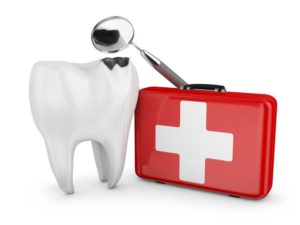
You brush your teeth twice a day for two minutes at a time. Your floss to get bits of food out from between your teeth. You avoid sugary snacks like the plague. Yet somehow, you’re still getting cavities. Meanwhile, your friend who hardly ever flosses ends every dental checkup with a clean bill of health. What gives? According to your dentist, some people are simply more vulnerable to getting cavities than others. Let’s examine five reasons why.
1. Diet
What you’re eating should be the first thing you adjust in your quest to have fewer cavities. Unless you brush and floss immediately after eating, sugars and starches sit on and between the teeth and along the gumline. Bacteria in your mouth then feast on these sugars and starches, creating acid that eats away at your tooth enamel and results in cavities.
To combat this, make some simple substitutions. Swap sodas and juices for water, and sweets with low-carb fruits and vegetables like carrots, which naturally scrub your teeth clean as you chew them.
2. Tooth Shape
Your teeth, especially your molars, have deep grooves that are more vulnerable to cavities because they’re harder to clean. They are also closer to the root of the tooth, so any erosion is more likely to cause a more painful cavity. Make sure to thoroughly clean your teeth at least twice a day to prevent this destructive decay.
3. Receding Gums
If your gums recede far enough, it exposes the sensitive roots of the teeth, giving bacteria easy access. Use fluoridated toothpaste, a soft-bristled brush, and an antibacterial mouth rinse to keep your teeth and gums clean. Also, visit your dentist to make sure your receding gums are not due to a larger health issue.
4. Dry Mouth
Not having enough saliva in your mouth is detrimental to your oral health. Saliva rinses your mouth out of leftover food particles that attract cavity-causing bacteria. To make up for a lack of saliva, regularly rinse with mouthwash and drink plenty of water throughout the day.
5. Oral Bacteria
Everyone’s mouth is different, including the bacteria that make up that mouth’s environment. Some people’s natural oral bacteria are more destructive than others. If yours is particularly aggressive, it can lead to more cavities than that of someone else. To combat this, add an oral rinse to your daily dental hygiene routine. It will enhance the quality of your enamel, providing extra protection against decay.
About the Author
Dr. Raj Vekariya earned a dental degree in India before moving to the United States and attending New York University’s College of Dentistry. Currently, he practices at Center One Dental in Canonsburg, PA. One of his largest priorities is helping patients feel comfortable in the dental chair. If you are prone to cavities, he will not judge you for the state of your mouth. He will simply heal you quickly and smoothly. To learn more, contact Dr. Raj at (724) 300-3700.
